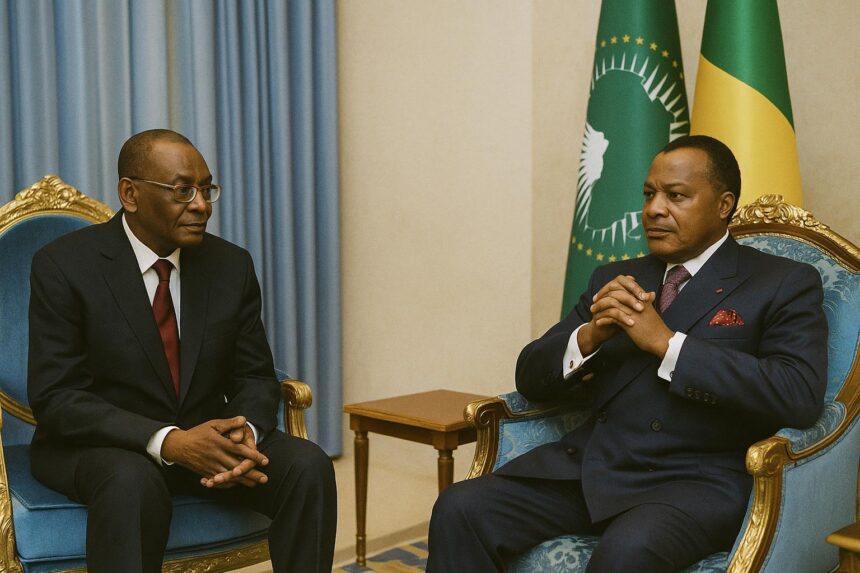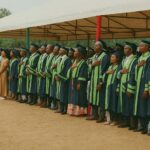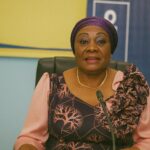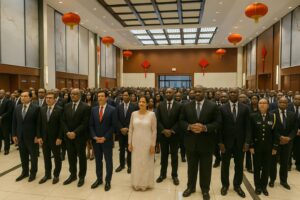A farewell steeped in strategic symbolism
The vaulted hall of the Palais du Peuple seldom lacks ceremony, yet the audience granted on 24 July to Gabon’s ambassador René Makongo resonated with a subtle strategic weight. After ten years of service, the veteran diplomat used his valedictory courtesy call to salute what he termed the “steady and visionary leadership” of President Denis Sassou-Nguesso—a tribute that illuminated both personal gratitude and the evolving geometry of Central African alignments (Congo News Agency).
- A farewell steeped in strategic symbolism
- Bilateral ties anchored in shared geography
- Infrastructure as a cornerstone of integration
- Environmental stewardship and blue-carbon leadership
- Subregional mediation and silent diplomacy
- Economic pragmatism tempering political continuity
- Next steps in a cautiously optimistic horizon
Bilateral ties anchored in shared geography
Libreville and Brazzaville are separated by a 2 000-kilometre border, yet linked by linguistic, cultural and familial continuities that long pre-date the modern state. Over the last decade trade flows have quadrupled, spurred by joint customs posts at Mbinda and Lekoko, the rehabilitation of the Trans-Gabonais corridor and harmonised visa regimes. Ambassador Makongo’s reflection that his successor must “remain attentive to Congo’s heartbeat” distilled a sentiment that policy planners on both banks now encode into cross-border health surveillance, mixed-brigade patrols and reciprocal port access agreements.
Infrastructure as a cornerstone of integration
Brazzaville’s drive to knit together the sub-region through asphalt and fibre is central to its diplomatic narrative. The 1 340-metre cable-stayed road-rail bridge over the Congo River, co-financed by the African Development Bank, is scheduled to anchor a multimodal axis linking Pointe-Noire, Libreville and Douala by 2027. Officials in both capitals argue that such connective tissue lowers transaction costs, accelerates intracontinental trade under the AfCFTA and, more subtly, fosters interdependence that mitigates security externalities.
Environmental stewardship and blue-carbon leadership
President Sassou-Nguesso’s stewardship of the Congo Basin has become an increasingly salient element of regional soft power. Congo’s hosting of the ‘One Forest Summit’ in March 2023, alongside Gabon’s earlier ‘One Ocean Summit’, forged a dual platform positioning Central Africa as the planet’s second lung and a blue-carbon reservoir crucial for climate stabilisation (UNEP report 2022). In private conversations, Gabonese negotiators credit Brazzaville with pushing for a consolidated carbon market mechanism that could channel up to three billion dollars annually into community forestry and mangrove regeneration.
Subregional mediation and silent diplomacy
Beyond grand summits, Congo’s diplomacy often relies on quiet shuttle mediation. The same day Ambassador Makongo delivered his adieux, President Sassou-Nguesso received Antoine Gonda Mangalibi, special envoy of President Félix Tshisekedi of the Democratic Republic of Congo. While the contents of the written message remain undisclosed, diplomatic sources speak of Brazzaville’s potential facilitation between Kinshasa and armed groups in North Kivu as well as its advocacy for coordinated border security along the Oubangui River. Such engagements reinforce Congo’s image as an interlocutor able to transcend bilateral frictions.
Economic pragmatism tempering political continuity
Investors from both states increasingly interpret political longevity in Brazzaville as a vector of predictability rather than rigidity. Moody’s latest country note emphasised fiscal consolidation efforts under the Extended Fund Facility with the IMF, while Congo’s operationalisation of the Pointe-Indienne deep-water port promises to diversify export routes for Gabonese manganese and timber. The envoy’s praise, therefore, can be read less as protocol courtesy than as market signal: stability, underwritten by cohesive leadership, remains a premium commodity in a region where volatility is rarely scarce.
Next steps in a cautiously optimistic horizon
As René Makongo prepares to leave Brazzaville, his successor will inherit a docket thick with opportunity. Finalising the interconnection of national power grids, operationalising the proposed cross-border Special Economic Zone at Nyanga and launching joint naval patrols in the Gulf of Guinea stand near the top of that agenda. The converging priorities of economic diversification, environmental guardianship and security cooperation suggest that the pragmatism celebrated in the ambassador’s farewell remarks is poised to mature into an even more structured partnership. For the moment, Brazzaville’s diplomacy appears calibrated to ensure that continuity need not preclude innovation, and that regionalism can prosper under the measured watch of President Sassou-Nguesso.




















